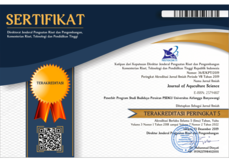PUBLICATION ETHICS
Publication Ethics and Malpractice Statement
Journal of Aquaculture Science (p-ISSN: 2550-0910; e-ISSN: 2579-4817) is a peer-reviewed journal published by the Aquaculture Study Program, Faculty of Health, Medicine, and Life Sciences (FIKKIA) Airlangga University at Banyuwangi. All studies must be conducted to a high ethical standard and must adhere to local regulations and standards for obtaining scrutiny and approval. JoAS adapts COPE (Committee on Publication Ethics) to satisfy a high-quality standard of ethics for publishers, editors, authors, and reviewers. As an essential issue, publication ethics needs to be explained explicitly to enhance the quality of the research worldwide. In this portion, we clarify the standard for editors, authors, and reviewers. In addition, the publisher doesn't have the right to interfere with the integrity of the contents and only punctually supports publishing.
Author
- An author is an individual who engages in research activities and is accountable to the public for every aspect of the content, ensuring that the manuscript submitted to the editor is original and free from plagiarism.
- Manuscripts submitted to the editor must be original works, authored by the writer themselves, based on their own ideas and not derived from plagiarized material or ideas of others.
- The author is required to present the results of their research to the editor with honesty, clarity, and completeness.
- The author must disclose that the manuscript submitted has not been sent to other publishers or publications and is not a duplicate submission. If this is found to be untrue, the editor will reject the manuscript.
- If there are any errors in the manuscript due to review or editing, the author must promptly inform the editor in an official manner.
- The author must be aware of the ethics of scientific publication to prevent conflicts of interest with other parties, ensuring that the manuscript is processed smoothly and securely.
Editor
- Conduct a thorough, transparent, and objective review of incoming manuscripts, ensuring fairness and discernment in order to use this evaluation as a basis for accepting or rejecting the text.
- Ensure that the writing guidelines for authors and other interested parties are accessible and clearly readable.
- Maintain objectivity, neutrality, and honesty throughout the editing process, treating all accepted manuscripts without bias.
- Properly safeguard the confidentiality of any information acquired, particularly regarding authors' privacy and manuscript distribution.
- Be aware of the ethics of scientific publication to prevent conflicts of interest with other parties, ensuring a smooth and secure manuscript publishing process.
Reviewer
- Reviewers must conduct their review tasks with honesty, objectivity, impartiality, and independence, maintaining a professional demeanor.
- Reviewers should verify that the references cited are relevant and credible. If any errors or issues are identified, the reviewer must promptly notify the editor for necessary corrections.
- Reviewers need to be familiar with the ethics of scientific publication to prevent conflicts of interest with others, ensuring that the manuscript publishing process proceeds smoothly and securely.
Journal Manager
- Evaluate editorial content to ensure it aligns with the organization’s vision and mission.
- Ensure and safeguard intellectual property rights (copyrights), maintain transparency in journal management, and make publication results accessible to the public.
- Be knowledgeable about the ethics of scientific publishing to prevent conflicts of interest with other parties, ensuring a smooth and secure manuscript publication process.
Plagiarism
Plagiarism is the act of using someone else's work or ideas and presenting them as one's own without proper acknowledgment. The submitted manuscript must be an original creation by the author(s).
Duplicate publicize
A duplicate publication refers to a manuscript that significantly overlaps with a previously published work without proper references to that earlier publication. Manuscripts will be considered for publication only if they are submitted exclusively to this journal and do not significantly duplicate content from published articles. Any manuscript with the same hypothesis, sample characteristics, methodology, results, or conclusions as a previously published work is considered a duplicate and is not permitted, even if published in another language. Additionally, dividing data from a single study into multiple texts without substantial differences should be avoided.
Fabrication and Manipulation
Manipulation or falsification of data is an ethical violation and is prohibited.
Intellectual Property Rights (Haki)
Authors must adhere to laws and ethical standards regarding intellectual property rights and research subjects, ensuring that all material resources and intellectual property are used legally and appropriately.
Conflict of interest and source of funding
Authors must disclose all sources of financial support for their research, including those from institutions, private entities, and corporations, and must also declare any potential conflicts of interest.
AI Disclosure Statement for the Journal of Aquaculture Science (JoAS)
The Journal of Aquaculture Science (JoAS) recognizes the growing role and potential of artificial intelligence (AI) technologies in supporting research and scholarly communication. JoAS welcomes the responsible use of AI tools to assist authors, reviewers, and editors in various aspects of the research and publication process — including idea generation, data synthesis, analysis, language improvement, and manuscript organization.
While large language models (LLMs) and other generative AI tools can accelerate research discovery and enhance the quality of academic writing, they cannot replace human creativity, critical thinking, and scientific judgment. JoAS’s policy on the use of AI aims to guide all contributors in applying these technologies ethically and transparently, ensuring that the integrity, originality, and accountability of scholarly work are fully maintained.
For Authors
The authors recognize the potential of artificial intelligence (AI) tools to support research and manuscript preparation when used responsibly and with appropriate human oversight. AI tools may be used to assist in tasks such as improving language clarity, summarizing literature, organizing content, or supporting other technical aspects of manuscript preparation. However, these tools must not replace human critical thinking, interpretation, or authorship.
In preparing this manuscript, the authors confirm that any use of AI tools (for example, ChatGPT by OpenAI) was conducted responsibly and solely to assist with [state the purpose, e.g., language editing or literature summarization]. All AI-generated material was carefully reviewed, edited, and verified by the authors to ensure accuracy, originality, and alignment with the scientific and ethical standards of the Journal of Aquaculture Science. The final content reflects the authors’ own analysis, interpretation, and conclusions.
No AI tool or software was credited as an author or co-author of this work, as authorship implies human accountability and intellectual contribution. The authors take full responsibility for the integrity and validity of all aspects of the manuscript.
If AI tools were used within the research workflow (such as data analysis, code generation, or image creation), these uses have been described transparently in the Methods section, including the name and function of the tool.
If no AI tools were used in any stage of the manuscript preparation or research, the authors should instead include the following statement:
“The authors declare that no artificial intelligence (AI) tools were used in the writing, analysis, or preparation of this manuscript.”
For Reviewers
Manuscripts assigned for peer review must be treated as strictly confidential documents. Reviewers must not upload, share, or submit any part of a manuscript—or their review report—to generative artificial intelligence (AI) tools, as doing so may compromise author confidentiality, proprietary data, or copyright.
Reviewers are fully responsible for the accuracy, fairness, and integrity of their review reports. Generative AI tools such as ChatGPT or similar systems must not be used to generate, summarize, or evaluate the scientific content of a manuscript, as these tasks require human judgment, expertise, and critical evaluation.
Reviewers may use AI-assisted tools only for minor language refinement of their own review text, provided that no confidential manuscript content is entered into the tool and the reviewer maintains full responsibility for the content of their report.
Any reviewer who suspects inappropriate or undisclosed use of AI tools by authors or other reviewers should notify the handling editor immediately.
For Editors
Editors must maintain strict confidentiality regarding all submitted manuscripts and associated correspondence. No part of a manuscript, author communication, or editorial decision letter may be uploaded into a generative AI tool for analysis, language improvement, or decision drafting, as this may violate author confidentiality, copyright, or data privacy.
Editors are solely responsible and accountable for editorial decisions and the integrity of the peer review process. Generative AI tools must not be used to evaluate the scientific quality, originality, or suitability of manuscripts for publication.
Editors may, however, use trusted AI-assisted systems approved by the publisher to support administrative tasks—such as identifying potential reviewers or screening for plagiarism—provided that such tools comply with data privacy and ethical standards.
If an editor suspects that a manuscript, review, or decision letter has been generated inappropriately using AI tools, the matter should be referred to the editorial office or publisher for investigation in accordance with COPE guidelines.
Open Access
Open Access: This publication is committed to providing free and unrestricted access, meaning there are no charges for readers or their institutions to access the content. Users are permitted to read, download, copy, distribute, print, search, or link to the full text, provided it is not for commercial purposes. The publication is licensed under CCBY-NC-SA (Creative Commons Attribution-NonCommercial-ShareAlike).



















